
OCEANOGRAPHY
Scope & Guideline
Exploring the Depths of Ocean Science
Introduction
Aims and Scopes
- Marine Biogeochemistry:
Investigation of the chemical, physical, biological, and geological processes occurring in the ocean, including nutrient cycles, trace metal dynamics, and the impacts of climate change on ocean chemistry. - Ocean Observing Systems:
Development and deployment of technologies and methodologies for long-term monitoring and data collection in marine environments, crucial for understanding ocean dynamics and changes over time. - Climate Change Impacts:
Research focused on the effects of climate change on marine ecosystems, including ocean acidification, sea level rise, and shifts in species distributions. - Marine Ecology and Biodiversity:
Studies exploring marine biodiversity, ecosystem functioning, and the interactions between species and their environments, particularly in response to anthropogenic pressures. - Community Engagement and Education:
Efforts to enhance public understanding of ocean science through outreach, education initiatives, and community involvement in scientific research. - Diversity, Equity, and Inclusion in Ocean Sciences:
Promoting diversity and inclusivity within oceanographic research and education, addressing barriers faced by underrepresented groups in the field.
Trending and Emerging
- Climate Adaptation Strategies:
A growing emphasis on practical strategies for adapting to climate change impacts on marine environments, including resilience planning and community-based approaches. - Technological Innovations in Oceanography:
The rise of new technologies such as autonomous vehicles, remote sensing, and advanced data analytics is transforming ocean research methodologies and enabling more comprehensive studies. - Interdisciplinary Collaborations:
An increasing trend towards interdisciplinary research that integrates oceanography with fields such as social sciences, public health, and policy-making to address complex ocean-related issues. - Microplastics and Marine Pollution:
Heightened focus on the sources, impacts, and mitigation strategies related to microplastics and other pollutants in marine ecosystems, reflecting growing public and scientific concern. - Ecosystem-Based Management Approaches:
A shift towards ecosystem-based management frameworks that consider the interconnectedness of marine ecosystems and human activities, aiming for sustainable resource use. - Community Science and Public Engagement:
An uptick in community science initiatives and public engagement strategies that involve non-scientists in ocean research and conservation efforts, fostering a sense of stewardship.
Declining or Waning
- Traditional Fisheries Research:
While still relevant, there has been a noticeable decrease in papers focused solely on traditional fisheries management and ecology, as interdisciplinary approaches gain more attention. - Historical Oceanographic Studies:
Research centered on historical datasets and analyses of past ocean conditions is less frequently published, possibly overshadowed by studies emphasizing current and predictive modeling. - Purely Theoretical Ocean Physics:
Theoretical studies in ocean physics without experimental or observational backing are becoming less common, as the field increasingly values empirical evidence and practical applications. - Local Case Studies:
Papers focusing exclusively on localized case studies without broader implications or connections to global oceanic processes are appearing less frequently. - Basic Oceanographic Methodology:
There is a shift away from publishing basic methodological studies in favor of innovative techniques and applications that show immediate relevance to current oceanographic challenges.
Similar Journals

Oceans-Switzerland
Advancing Environmental Science through OceanographyOceans-Switzerland, published by MDPI, is an esteemed open-access journal established in 2020, with a focus on providing a platform for the dissemination of high-quality research in the fields of Environmental Science and Oceanography. Based in the picturesque city of Basel, Switzerland, the journal seeks to foster a deeper understanding of oceanic processes and their implications for the environment through rigorous peer-reviewed articles. With an impact factor reflected in its 2023 Scopus rankings, placing it in the 56th percentile across its categories, Oceans-Switzerland continues to promote interdisciplinary collaboration and innovation, targeting a wide audience of researchers, professionals, and students keen on exploring the complexities of ocean systems. The journal's commitment to open-access policy ensures that groundbreaking research is available to a global audience, reinforcing its crucial role in advancing knowledge and shaping practices within the scientific community.
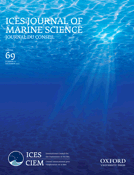
ICES JOURNAL OF MARINE SCIENCE
Delivering Cutting-Edge Insights into Our OceansThe ICES Journal of Marine Science, published by Oxford University Press, stands at the forefront of marine research, offering cutting-edge insights into aquatic sciences and oceanography since its inception in 1903. With its ISSN 1054-3139 and E-ISSN 1095-9289, this esteemed journal has garnered a reputation for excellence, evidenced by its Q1 rankings in categories such as Aquatic Science, Ecology, and Oceanography as of 2023. The journal's commitment to advancing knowledge in marine systems makes it an essential resource for researchers, professionals, and students alike, who are keen to explore the intricate ecosystems that sustain our planet. Without an open access model, the journal maintains a rigorous editorial standard and is recognized among the top journals, ranking impressively in various Scopus categories. Authored contributions reflect pioneering research that informs policy and fosters sustainable practices, making this journal a critical platform for disseminating marine science knowledge.

Frontiers in Marine Science
Advancing Understanding of Our Ocean EcosystemsFrontiers in Marine Science, published by FRONTIERS MEDIA SA, stands as a leading open-access journal dedicated to advancing our understanding of marine ecosystems and their interconnectedness with global environmental systems. With a focus that spans a range of vital sub-disciplines including Aquatic Science, Oceanography, and Ocean Engineering, this journal has achieved prestigious rankings within the Q1 category in multiple areas as of 2023. The journal, thriving since its inception in 2014, promotes high-quality, peer-reviewed research that addresses critical challenges in marine and environmental science, making it an invaluable resource for researchers, professionals, and students alike. Located in Switzerland, Frontiers in Marine Science is committed to accessible scientific knowledge, boasting an impressive impact through a wide array of contributions from the global community. The journal's aim is to foster collaborative research efforts and innovative responses to the pressing issues facing our oceans and waterways today.
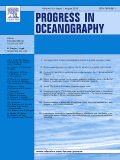
PROGRESS IN OCEANOGRAPHY
Unveiling the Mysteries of Our OceansPROGRESS IN OCEANOGRAPHY is a pivotal journal published by PERGAMON-ELSEVIER SCIENCE LTD, dedicated to advancing the field of oceanographic research and exploration. With an ISSN of 0079-6611 and an E-ISSN of 1873-4472, this esteemed publication has been disseminating significant findings from 1963 and continues to be a cornerstone in aquatic sciences and geology, holding a distinguished Q1 ranking in both categories as of 2023. The journal primarily focuses on innovative research that contributes to our understanding of ocean processes, marine ecosystems, and the impact of human activities on the oceans. Its exclusive access model facilitates the dissemination of high-quality content that resonates with researchers, professionals, and students alike, ensuring that vital insights are accessible to the global scientific community. With a firm commitment to upholding rigorous scientific standards, PROGRESS IN OCEANOGRAPHY remains an influential platform for the communication of groundbreaking research, providing scholars with invaluable resources to drive future oceanographic studies.
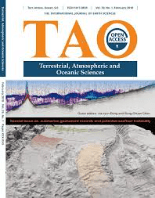
TERRESTRIAL ATMOSPHERIC AND OCEANIC SCIENCES
Pioneering Discoveries in Terrestrial SciencesTERRESTRIAL ATMOSPHERIC AND OCEANIC SCIENCES, published by SpringerNature, is a distinguished peer-reviewed journal that has been an essential platform for innovative research in the fields of atmospheric science, oceanography, and Earth and planetary sciences since its inception. With an Open Access policy established in 1990, the journal ensures wide dissemination of knowledge, allowing researchers, professionals, and students to access cutting-edge findings without restrictions. Based in Switzerland and featuring a comprehensive coverage from 1996 to 2024, the journal currently holds a Q3 ranking across various categories, indicating its growing significance in the scientific community. Although it is positioned within the 39th percentile in Earth and Planetary Sciences, its commitment to fostering high-quality research makes it a valuable resource for advancing understanding of terrestrial environments and their interconnections. Researchers seeking a platform for their work in atmospheric and oceanic sciences will find TERRESTRIAL ATMOSPHERIC AND OCEANIC SCIENCES to be an ideal venue for sharing their insights with a global audience.
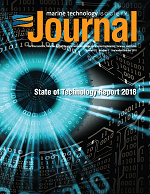
MARINE TECHNOLOGY SOCIETY JOURNAL
Charting New Waters in Marine Technology ResearchMARINE TECHNOLOGY SOCIETY JOURNAL, published by the Marine Technology Society, Inc., serves as a critical forum for advancing the field of marine engineering and oceanography. With a rich history dating back to its inception in 1969 and continuing through various converged years until 2024, this journal is recognized for its contributions to the understanding of marine technologies and their applications. It currently holds a notable Q3 ranking in both Ocean Engineering and Oceanography, as per the 2023 metrics, underscoring its significance in these domains. Although access is not open, the journal rigorously assesses and publishes high-quality research articles, technical notes, and reviews that engage a wide readership of researchers, industry professionals, and students alike. With the journal's aim to disseminate innovative findings and foster dialogue within the marine community, it promises to be an essential resource for anyone looking to explore the dynamic field of marine technology.
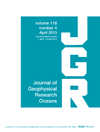
JOURNAL OF GEOPHYSICAL RESEARCH-OCEANS
Charting New Waters in Geophysical ResearchJournal of Geophysical Research-Oceans is a premier interdisciplinary journal published by the American Geophysical Union, focused on the dynamic field of ocean sciences. With a rich history dating back to 1986, this journal has become a pivotal platform for researchers, providing a wealth of data and innovative insights into oceanographic processes and their essential role within the Earth's system. The journal enjoys an impressive impact factor and consistently ranks in the Q1 quartile across numerous categories, including Earth and Planetary Sciences and Oceanography, making it a respected source for cutting-edge research and reviews. Notably, it holds significant positions within Scopus rankings, further emphasizing its importance in shaping the scientific discourse surrounding oceanic phenomena. While available through subscription, the Journal of Geophysical Research-Oceans remains an invaluable resource for academics, industry professionals, and students eager to deepen their understanding of ocean dynamics and geophysical interactions.

Ocean and Coastal Research
Fostering interdisciplinary insights for ocean conservation.Ocean and Coastal Research, published by the Institute Oceanográfico of the University of São Paulo, is an essential academic journal dedicated to advancing the fields of Aquatic Science, Oceanography, and Water Science and Technology. Established in 2020, the journal has quickly become a noteworthy platform contributing to the understanding and sustainable management of marine and coastal ecosystems, with an open access model that promotes the dissemination of critical research findings. Although currently categorized in the fourth quartile across its respective fields in 2023, the journal serves as an emerging repository of valuable insights for researchers, professionals, and students alike, aiming to make impactful discoveries that address contemporary challenges in ocean conservation and resource management. The journal's editorial team is committed to fostering interdisciplinary collaboration and upholding rigorous peer-review standards, thereby ensuring high-quality contributions that reflect the dynamic nature of marine science. With an E-ISSN of 2675-2824, all access to published articles is freely available, supporting global research efforts addressing crucial environmental issues.

Journal of Ocean University of China
Connecting Scholars to Shape the Future of the SeasThe Journal of Ocean University of China, ISSN 1672-5182, is a premier academic journal dedicated to advancing the fields of Ocean Engineering and Oceanography. Published by the esteemed Ocean University of China, the journal serves as a vital platform for researchers, professionals, and students to disseminate groundbreaking findings and foster collaboration in marine science and engineering. With a commitment to quality, the journal currently holds a Q3 ranking in both Ocean Engineering and Oceanography as of 2023, indicating its significant contributions within the scientific community. The journal's scope encompasses a wide range of topics including marine technology, ecological studies, and coastal management, all aimed at enhancing the understanding and utilization of oceanic resources. Although currently not Open Access, it continues to attract submissions from renowned scholars, ensuring a diverse and innovative range of research. By providing access to cutting-edge research and practical insights, the Journal of Ocean University of China plays a critical role in shaping the future of ocean sciences and engineering.

JOURNAL OF OCEANOGRAPHY
Exploring the Depths of Marine ScienceJOURNAL OF OCEANOGRAPHY, published by Springer, stands as a leading academic journal in the field, with an impressive Q1 ranking in Oceanography for 2023. Since its inception in 1992, this journal has dedicated itself to the dissemination of high-quality research that spans a diverse array of topics within oceanography and earth sciences. With an ISSN of 0916-8370 and an E-ISSN of 1573-868X, it plays a crucial role in bridging the gap between academia and practical marine applications. The journal is indexed in Scopus, ranking #57 out of 145 in its category, reflecting its rigorous academic standards and the impact of its published works, reaching a notable ile in the 61st percentile. Located in Japan, the JOURNAL OF OCEANOGRAPHY provides a vital platform for sharing significant research findings that contribute to our understanding of marine environments, aiming to foster interdisciplinary collaboration among researchers, professionals, and students dedicated to marine science.